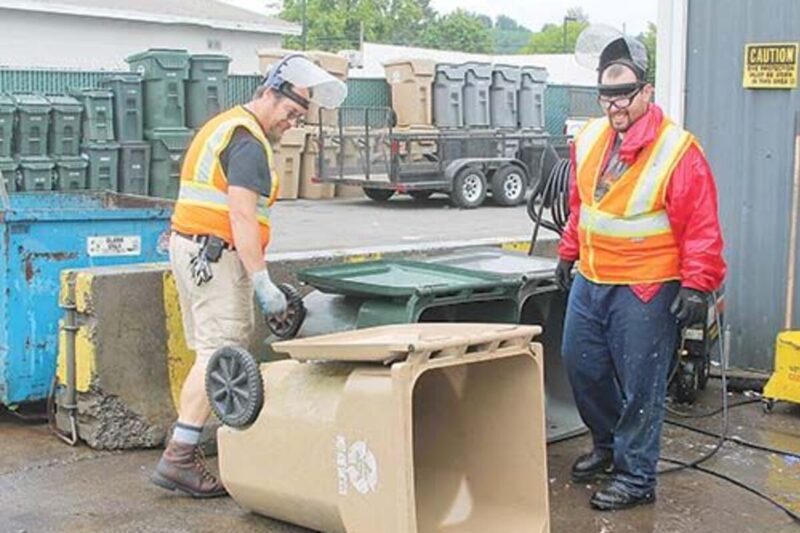Sean C. Morgan
Pressure washer in hand, Sunshine Industries client Jason Gorby blasted away the dirt from trash, recycling and yard debris cans on his first day at a mainstream job at Sweet Home Sanitation.
He went to work there on June 2.
The 34-year-old is the first client to go to work under a state mandate that imposed a requirement on organizations like Sunshine Industries, which provide employment, education and social opportunities for developmentally disabled persons. The mandate is based on the premise that “everyone can work.”
As a result, Sunshine is trying to place clients in mainstream jobs independent of its own programs.
Sunshine has provided jobs in-house to clients with disabilities for decades. Today, Sunshine clients offer, for example, janitorial and landscaping services.
Under the Employment First mandate, Sunshine Industries has helped him find work outside of the organization. Gorby is working for Sweet Home Sanitation through the Labor Ready staffing agency.
“Jason’s been hired by Sweet Home Sanitation to work as part of their crew,” said Bruce Hobbs, job developer with Sunshine. “We’re starting with can washing. He’ll start working on fixing the cans later and other jobs as assigned. He’s part-time, which is what he wanted to work. He got the hours he wanted. This was his first pick of places he would like to work.”
When cans are dirty or cracked, Sweet Home Sanitation picks them up and replaces while picking up the trash. The dirty and damaged cans are taken to the yard at the transfer station off 18th Avenue. There they are cleaned and repaired.
Hobbs is spending time on site to help train Gorby, to ensure he works safely and to get him up to speed.
“I’ll train with him until he’s able to do it,” Hobbs said. Once training is complete, Gorby will be able to work independently.
At Sunshine, clients tell staff what type of work they’re interested in doing, Hobbs said. Staff members evaluate whether clients’ goals are realistic, and they assist them in getting the job.
Some jobs aren’t realistic for clients, he said, explaining, for example, that while he could play around with physics, he personally will never be a physicist.
“I get them matched as closely as possible to their dream job,” Hobbs said. From there, it’s a matter of building the skills they need.
That’s one benefit to employers, he noted. Staff members train the clients. It’s not just menial labor. They can do clerical work, and one current client used to work at Entek Manufacturing.
Another benefit, “statistically, (is that) this community, once they get on a job, they don’t leave,” Hobbs said. Turnover is low among the developmentally disabled.
For them, it’s a way to be part of the community, to have a job, to not be marginalized, he said. “The paycheck is just an added bonus.”
Clients take care of work they can do, freeing more skilled employees – qualified truck drivers and welders, for example – to focus on that kind of work, Hobbs said. There’s no reason for a qualified truck driver or welder to clean and repair cans.
From a business perspective, that’s exactly what Sweet Home Sanitation is doing, said Brian Hoffman, site manager. Last year, a high school student did the job.
“For me, it’s a good thing to do,” Hoffman said. “I think ultimately, Jason will do awesome.”
Gorby, 34, is working three days a week.
“I like it, cleaning all the cans,” said Gorby, who is affected by a traumatic brain injury. The job makes him happy.
“I can uplift some other people, work out in the community.”
He’s getting away from the old routine and doing something different, he said, and it makes money.
Up to a point, Hobbs said, people receiving Social Security disability benefits can work, and they can earn more money monthly by working. The first $80 has no effect on their benefits. Above that, their benefits decrease by just $1 for each $2 the earn.
Even if they completely wipe out their benefits by working, they have a trial period where if they lose their jobs or can no longer physically do the job because a disability gets worse they can get back into the system without completing the full amount of paperwork required.
Gorby is looking forward to spending his first paycheck. He figures he’ll probably spend some of it on video games.
The mandate for work is just getting going across the state, Hobbs said. “They haven’t worked out all the kinks,” but he and Sunshine are working on it from their end, seeking work their clients can do that can benefit different employers.
“Part of our job is to go into a job site and kind of look around,” Hobbs said. “I’m keeping an eye out for different jobs right now.”
Sweet Home Sanitation has been “very open and receptive,” Hobbs said. The company has been supportive over the years and hired Sunshine crews on a regular basis.
“They’ve done a lot of work for us,” Hoffman said. Sunshine has helped clean the exterior of Sweet Home Sanitation facilities. “That’s how that’s evolved.”
“This position came open, and we were able to fill it with Jason,” Hobbs said.
“Jason has always had a special spot for Sweet Home Sanitation even prior to them working around us,” Hoffman said. He has a decent relationship with most of Sweet Home Sanitation’s drivers.





